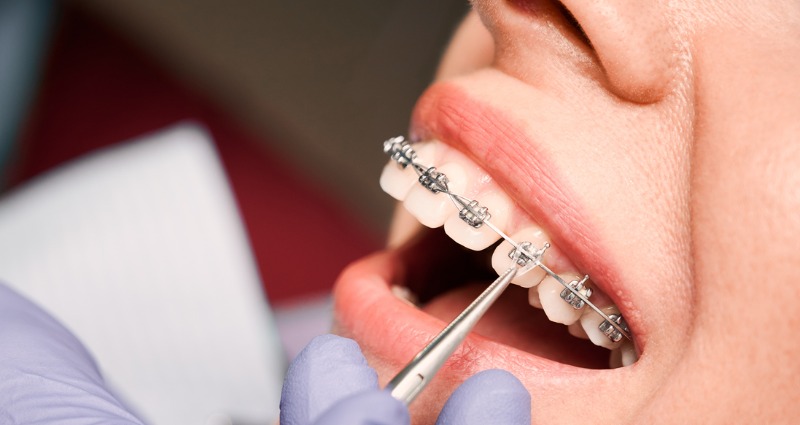Braces work to correct dental problems including malocclusion (bite), crooked and crowded teeth. Orthodontic treatment takes place over months or even years with teeth slowly being moved into their correct position. For treatment to keep progressing, we must tighten braces regularly.
What Happens During a Braces Tightening Appointment?
Everyone with braces needs follow-up appointments after their braces are fitted. It allows your orthodontist to check the progress of your teeth to ensure they are moving in the right direction, angle and at the expected rate.
The word “tightening” probably refers to a historical process when steel wires were routinely used to straighten teeth. The orthodontic wires would be tied into place with fine steel wires and in some cases, the wire would be progressively engaged in the bracket by tightening these fine wires. Historically this was quite an uncomfortable process. In contemporary orthodontic practice the wires that we use are much softer and generally have incredible springiness and the wire is clipped in with a cover or an elastic with significantly lower force than when we used steel wires. During appointments, your orthodontist will unclip the cove or remove the elastics around the brackets and progressively increase the size of the wire to slowly move the teeth into position. This process of placing larger, stiffer wires may feel tighter than when the first wires were placed but you will notice the teeth moving slowly into place.
It’s this pressure that causes the teeth to move into the desired position.
Do I Need to Do Anything Different After Braces are Tightened?
Your orthodontist will give you instructions on anything that has changed following this appointment. For example, you may need to wear elastics for the first time, so we’ll show you how to put them on and take them off to eat and brush your teeth but you can expect mild discomfort with new wires.
Does it Hurt When Braces are Tightened?
After your orthodontist tightens your braces, your teeth can feel sore for a few hours up to a few days. After this time, your teeth grow accustomed to the new arch-wire and the soreness eases. Sometimes you won’t feel any pressure following an appointment while other appointments you may.
Pain Relief
You can take over-the-counter pain relief medication. Only use the medication for a few days. In the rare event that the pain doesn’t improve after this time, contact your orthodontist.
When you’re home and your teeth are sore, you can use a cold/ice compress on the outside of your jaw and lower cheeks. The cold compress can decrease inflammation and ease discomfort. Drinking ice cold water can also help with numbing sore gums and reducing any inflammation.
You can also try a topical oral numbing gel on your gums. Apply the gel with a clean finger to desensitize areas of the mouth that are uncomfortable. Even massaging the gums with your finger can provide some relief as it stimulates blood flow in the area.
Considering Orthodontic Treatment for Your Child?
There are many advantages to starting orthodontic treatment for children at a young age. Improve your child’s smile and book an appointment!
Soft Food Diet
If your teeth are sore, try to eat soft foods until your teeth have adjusted to the new wire. Any food that doesn’t require chewing will be easier to consume. Some good soft food options include:
- Mashed potato
- Soups and stews
- Slow cooked tender meats
- Milkshakes and smoothies
- Fruit sorbets
Dental Hygiene
Even if your teeth are sore, it’s important not to miss brushing and flossing your teeth at least twice daily. You don’t want any plaque to settle on your teeth as it can cause discoloration or decay.
Think About the End Result
For most patients, braces “tightening” appointments become less uncomfortable with time. During the first few appointments, your teeth are still getting accustomed to wearing braces and moving in the gums. Appointments later on in your treatment will no doubt feel less uncomfortable.
While some appointments to tighten your braces might be an uncomfortable part of treatment, remember how good your teeth will look when you’ve finished treatment. The discomfort will be a distant memory as you enjoy perfectly aligned teeth that should last you a lifetime.
Remember, don’t wait for your next follow-up appointment if you experience any problems with your braces. If you break the arch-wire, the wire is poking into your cheek or a bracket comes off the tooth, contact the practice to come in as soon as possible. The longer you leave a broken part, the higher the chance your teeth will move back. Find a Orthodontist near you https://caortho.org/locations?zip=92374&d=5
Source: https://www.theorthodontists.com.au/blog/what-does-tightening-braces-do

